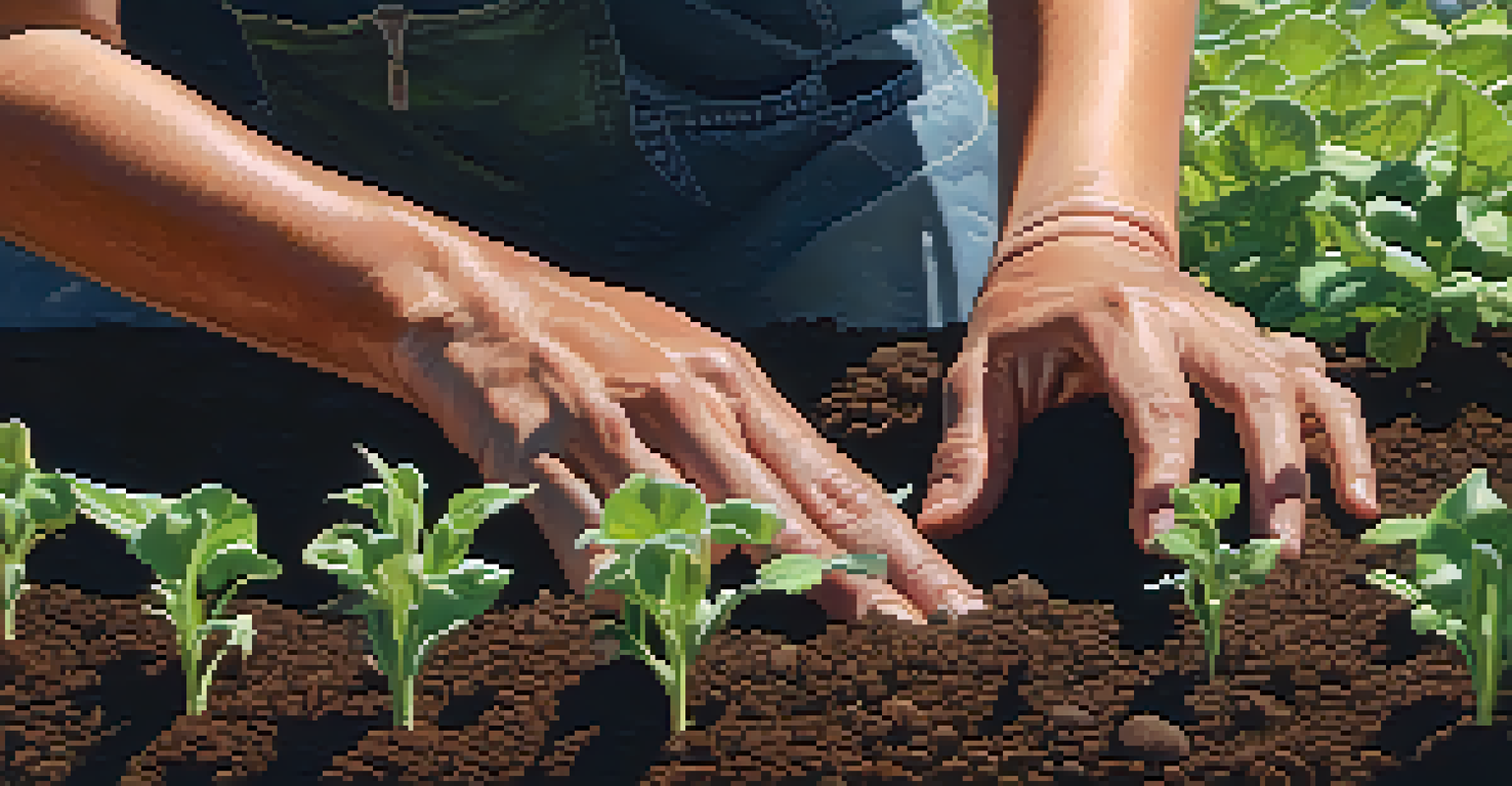Economic Impact of Agriculture in Georgia: An In-Depth Analysis

Understanding Agriculture's Role in Georgia's Economy
Agriculture is a cornerstone of Georgia's economy, significantly contributing to the state's GDP. With a diverse range of crops and livestock, it employs thousands of residents and supports related industries. From peaches to peanuts, Georgia's agricultural output is not just vital for local consumption but also for export markets.
Agriculture is not just a job; it’s a way of life that shapes our culture and economy.
The state's climate and soil conditions are favorable for a variety of agricultural products, making it a prime location for farming. This diversity allows Georgia to adapt to market demands and capitalize on both domestic and international opportunities. Agriculture, therefore, acts as a stabilizing force for the economy.
Moreover, agriculture fosters innovation and sustainability, with many farmers adopting advanced technologies. This not only boosts productivity but also aligns with modern environmental standards. As such, the agricultural sector is pivotal in shaping Georgia's economic landscape for the future.
Major Agricultural Products and Their Economic Contributions
Georgia is often dubbed the 'Peach State,' but its agricultural portfolio is much broader. Key products include cotton, poultry, and pecans, each playing a significant role in the state’s economy. For instance, Georgia is the largest producer of peanuts in the U.S., which brings in substantial revenue and supports local farmers.

Cotton also holds historical significance and continues to be a major cash crop, providing jobs and income for thousands. The poultry industry, on the other hand, stands out as a powerhouse, generating billions in economic output and job creation. These products not only contribute directly to the economy but also support ancillary industries.
Agriculture Boosts Georgia's Economy
Agriculture significantly contributes to Georgia's GDP by providing employment and supporting various related industries.
Additionally, the export of these agricultural goods strengthens Georgia's position in global markets. This interconnectivity showcases how local farming practices can have far-reaching economic implications, boosting trade and fostering community resilience.
Employment Opportunities in Agriculture and Related Sectors
Agriculture in Georgia is a significant source of employment, supporting a wide range of jobs from farming to food processing. Directly, the sector employs thousands of workers who manage farms, operate machinery, and oversee production. In addition, many more find work in related fields such as logistics, distribution, and retail.
Innovation in agriculture is essential to provide food for a growing population while protecting our natural resources.
The ripple effect of agricultural employment extends beyond the farm, benefiting local communities and economies. For example, the need for transportation and storage facilities creates additional jobs in trucking and warehousing. This interconnectedness illustrates how agriculture acts as a job multiplier within the state.
Moreover, as agriculture evolves with technology, new roles are emerging in areas like agribusiness and sustainable farming practices. This shift not only enhances job opportunities but also encourages workforce development, ensuring that Georgia's agriculture remains competitive and innovative.
The Role of Technology in Enhancing Agricultural Productivity
Technology plays a transformative role in Georgia's agriculture, driving efficiency and productivity. Farmers are increasingly adopting precision agriculture tools, such as drones and satellite imagery, to monitor crop health and optimize resource use. This data-driven approach allows for better decision-making and higher yields.
In addition, advancements in biotechnology have led to the development of crops that are more resilient to pests and climate change. Such innovations not only safeguard the environment but also ensure food security for the growing population. As a result, technology is paving the way for sustainable agricultural practices.
Diverse Crops Drive Economic Growth
Georgia's key agricultural products, such as peanuts and poultry, not only generate substantial revenue but also enhance the state's position in global markets.
Furthermore, the integration of e-commerce platforms has opened new markets for farmers, enabling them to reach consumers directly. This shift not only enhances profitability but also connects local farmers with the community, fostering a sense of partnership in food production.
Environmental Impact of Agriculture in Georgia
While agriculture is essential for economic growth, it also poses challenges for environmental sustainability. Issues such as soil degradation, water usage, and pesticide runoff are critical concerns that need addressing. However, many Georgia farmers are adopting practices that promote environmental stewardship.
For example, implementing crop rotation and cover cropping helps maintain soil health and reduce erosion. Additionally, initiatives focused on water conservation are becoming increasingly popular, ensuring that vital resources are used efficiently. These efforts not only benefit the environment but also enhance the long-term viability of farming.
Moreover, educational programs and resources are available to help farmers transition to sustainable practices. By prioritizing environmental health, Georgia's agricultural sector can continue to thrive while minimizing its ecological footprint.
The Future of Agriculture and Economic Growth in Georgia
Looking ahead, the future of agriculture in Georgia appears promising, with opportunities for growth and innovation. The increasing demand for locally sourced and organic products presents new avenues for farmers to explore. This trend not only supports local economies but also fosters healthier communities.
Additionally, the integration of sustainable practices will play a crucial role in shaping the agricultural landscape. As consumers become more environmentally conscious, farmers who prioritize sustainability are likely to gain a competitive edge. This shift aligns with broader economic goals, promoting responsible growth.
Technological Innovation in Farming
The adoption of advanced technologies in agriculture is improving productivity and sustainability, ensuring the sector's future viability.
Finally, collaboration between farmers, government, and educational institutions will be vital in driving research and development. By investing in agricultural education and resources, Georgia can cultivate a workforce prepared to tackle future challenges and seize emerging opportunities in the sector.
Policy Implications for Enhancing Agriculture's Economic Impact
Government policies play a crucial role in shaping the agricultural landscape and its economic impact. Supportive legislation can enhance funding for research, provide subsidies, and promote sustainable practices. Farmers benefit from such initiatives, leading to increased productivity and economic stability.
Moreover, policies that encourage local food systems can bolster community resilience. By investing in infrastructure for food distribution and processing, Georgia can create a robust agricultural economy that supports both farmers and consumers. This interconnected approach fosters a sustainable economic ecosystem.

Finally, ongoing dialogue between stakeholders is essential for effective policy-making. By listening to the needs of farmers and communities, policymakers can create targeted programs that address specific challenges and opportunities within the agricultural sector.